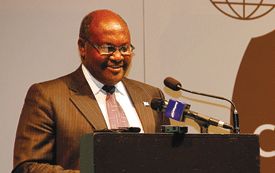Integration bottlenecks hinder Africa's potential
MBONGENI MGUNI
Staff Writer
| Wednesday May 22, 2013 00:00


SWIFT, a global cooperative providing a platform for financial institutions to send and receive information on financial transactions, is holding its 20th African Regional Conference in Gaborone until Thursday.
This year, the organisation, which has more than 10,000 financial institutions and corporations in 212 countries, is focusing on how to maintain Africa's momentum as one of the world's fast growing regions.Yesterday, experts pointed out that while African states had made great strides for connectedness across borders and greater financial inclusion among their individual populations, these efforts still lagged behind other competing continents.
The experts pointed out that Africa's status as the rising star of global growth would be constrained and unsustainable if its populations and economies remained disjointed, affecting its ability to create sustainable wealth.
'The shift towards economic interconnectedness brings with it increased opportunities for a more equitable sharing of the benefits of global wealth and income,' Finance and Development Planning Minister Kenneth Matambo said at the conference. 'In order to realise this, there needs to be increased inclusiveness in economic governance at global, regional and sub-regional levels for the benefit of all citizens of the continent.'
For his part, SWIFT head of Western Europe, Middle East and Africa, Christian Sarafadis said mobility, in all its forms, was among the greatest barriers to continental integration.'There are challenges with mobility of people, where nearly everyone has experienced problems with visa (requirements) across the continent,' he said.
'Only 40 percent of African countries grant visas on arrival, compared to other regions where it's up to 80 percent.'In terms of mobility of goods, there's complexity of customs clearance across the continent and we also see challenges with mobility of money.'
Nerina Visser, Nedbank Capital head of Beta Solutions said one example of the simple integration challenges African states needed to address was the railroad system, as most had been built in colonial times largely for the extraction of raw materials.
'It's clear that they were built by a colonial mind looking at taking commodities out of Africa,' she said, in discussing barriers to cross border trade at the conference.'There are complications in that even where one would want them (railways) to meet, you find that they are of different standards. We need to develop the infrastructure in such a way that the focus is on movement in Africa, not just out of Africa'.
Visser noted that cellphone communication across different countries in the continent were fraught with high costs and other challenges. In addition, she said, cross border currency trade and related activities on the continent were made more expensive by being based on the US dollar.
This year's SWIFT African Regional Conference is the biggest of its kind with 435 participants and the first to be held in Botswana. As in previous events, this year's conference has attracted the cream of Africa's bankers, corporates and policy makers.
